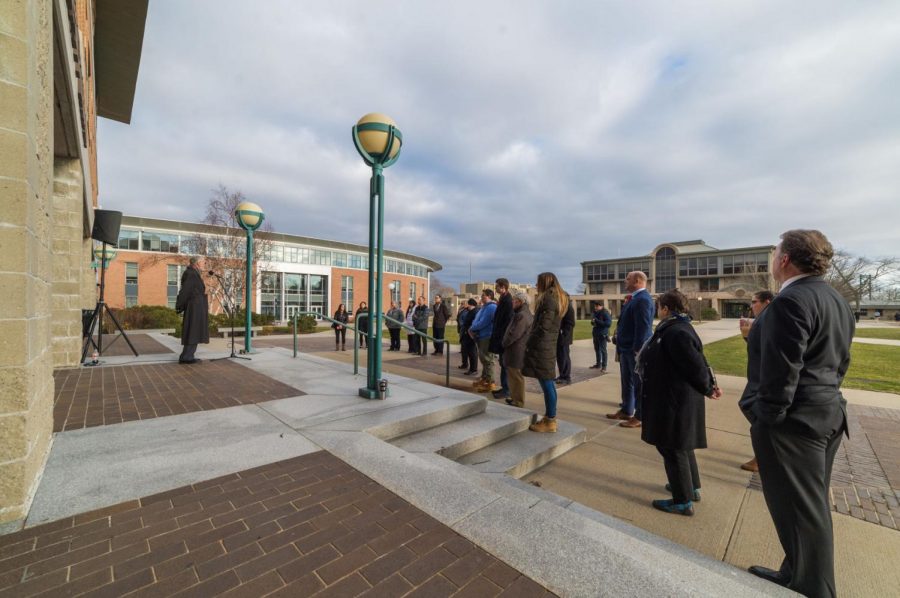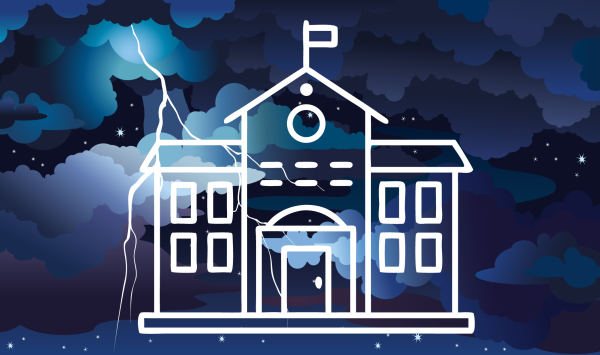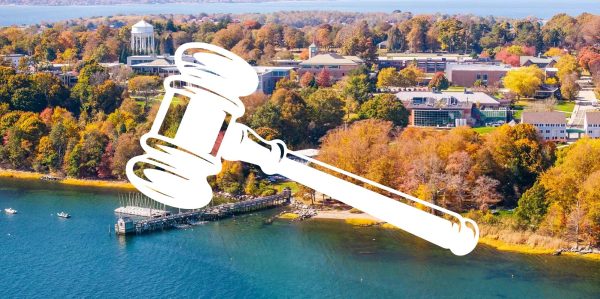RWU responds to gun violence
Remember. Educate. Act.
On Tuesday, March 6, students, faculty, staff, and members of the administration gathered to do those three things in response to the most recent shooting at Marjory Stoneman Douglas High School, during which a single shooter took the lives of 17 people in Parkland, Florida.
According to event organizer Kayla Ebner, a junior at the university, the event seeks “to remember the victims of recent mass shootings, to help educate ourselves on the topic of gun violence, and to help inform ourselves on the ways we can make a difference when it comes to gun violence.”
Ebner continued, “Students and people are becoming much more active than in the past, and we want to show that we support these students who are working so hard to bring change, and also start a discussion on campus and allow for questions to be asked.”
The University’s multi-faith chaplain, Reverend Nancy Soukup, led the vigil, invoking a moment of silence for the members of the Marjory Stoneham Douglas High School community.
“We must therefore take hold of this simple fact: that the violence is not the end of the story,” she said. “Parkland High School students, parents of Newtown students, and other champions who challenge gun violence — they are the rising phoenixes of this story, and they call out to us for our voices to join theirs, chanting ‘Not here. No more. Never again.’”
Vice President of Student Life John King took to the microphone next. To the students in support of the event, King said, “Your generation has had an unbelievable burden placed upon you in terms of what has been happening with these mass shootings. Just in the last six years of your life, there have been several significant shootings, and this last one, you can relate to especially, because just a year or two ago, you were in a school setting like that.”
“Because this stuff only happens in one country in this world, and it’s ours. So it’s our responsibility,” King said, encouraging students to engage in conversations with friends and mentors about emotions surrounding gun violence.
University President Donald J. Farish praised the theme of the event, deeming it particularly appropriate for the university setting.
“As we move into ‘Educate’ and ‘Act,’ there’s a logical progression that happens here so that we don’t find ourselves feeling that we’re on a treadmill or that it’s Groundhog Day… where periodically we’re going through exactly the same set of reactions and emotions to what feels like the same event all over again, never to end,” Farish said. “It’s very important we try to take control of this in some fashion so that these events don’t control us or, in the process, have us become inured to the sudden loss of life and cheapen the whole notion of what it means to live.”
Farish also made reference to an email he had sent the university community on March 1, in which he released a statement to future Roger Williams students informing them that their acceptance into the university would not be impacted by their participation in peaceful protests against gun violence.
Roger Williams University is one of 117 colleges and universities nationwide that released a statement ensuring future students that their admission into the school would not be revoked if they chose to engage in school walkouts. Massachusetts Institute of Technology, the University of Connecticut, Boston University, and Tulane University also put out similar remarks.
These “walkouts” began after the high school shooting in Parkland, Florida. People across the country, including many students, were enraged that the shooter had access to an automatic weapon. As with any form of protest, there was backlash from school teachers, principals, and parents. Many districts have made it clear that the result of this protest will be suspension. Superintendent Todd Gray of Wisconsin’s Waukesha School District stated, “This is not at all about students. At no time have we said students cannot make a statement peacefully while staying in school.”
President Farish stated, “I want to assure today’s high school students that your participation in peaceful protests not only is an appropriate exercise of your First Amendment rights, but also in no way jeopardizes your acceptance as an incoming student at RWU.”
The national school walkouts are continuing through the month, scheduled for March 14 and March 20. In addition, on March 24, the kids and families of March For Life will take to the streets in protest of gun violence. The national march will take place in Washington, D.C., but there will be marches in most major cities that same day, including Providence and Boston. Visit marchforourlives.com for more information.
Following the vigil held on the steps of the University Library, attendees headed inside to the Mary Tefft White Cultural Center where Dean Eric Bronson of Justice Studies School and Professor of Law Carl Bogus provided information regarding the history of the Second Amendment of the U.S. Constitution, which protects the right of the people to bear arms; guns as a deterrent to burglary/home invasion crimes; statistics on gun violence.
Contrary to the widely held belief that advertising the presence of a gun is a deterrent to crime, Bronson discovered that, among the inmates he spoke with during his study throughout various U.S. states, the presence of a gun was actually an enticement for criminals to go into a house because they knew that they would be able to sell the gun for much more money than they would be able to sell anything else they managed to steal.
“If we look at gun ownership and the states that have higher rates of gun ownership, they have higher murder rates, they have higher rates of suicide, and higher rates of accidental shootings,” Bronson said.
“However, it’s not just gun ownership,” Bronson continued, adding that, for example, Canada has a higher rate of gun ownership than the United States does. He explained that major differences between the two countries in terms of gun laws include the types of guns that are being purchased in Canada, as Canadians tend to buy rifles and shotguns for hunting. Another major difference that Bronson cited is the process of purchasing a gun. In Canada, there is a two-week background check through which the seller can determine whether or not a potential buyer has a criminal record or a history of domestic violence and/or mental illness. Canada’s murder rate is significantly lower than that of the United States. One of the biggest loopholes in the gun purchasing process is the gun shows, during which a five minute background check may take place before a person can leave with a gun in their possession.
Bronson brought up the gun control laws that exist in Rhode Island, explaining that the state is known to be tougher on gun control than others based on the Brady Campaign to Prevent Gun Violence, which correlates with the state’s very low murder rate.
The influence of the National Rifle Association (NRA) was discussed after an audience member asked about the argument that people ‘will get the guns anyway,’ regardless of whether or not it is through legal means. According to the presenters, it seems as though when people feel threatened, as they do when pro-gun control discussions sweep over the country, gun manufacture stocks go up. When gun owners and supporters feel at ease, however, these stocks go down, as they did when President Donald Trump was elected.
In response to an audience question regarding the economic impacts of the banning of automatic rifles, Bronson simply said, “The profits are not equal to a human life… if we save human lives, [then] it’s worth it to me.”
Bronson and Bogus spoke to the correlation between an increase in fear of crime and an increase in sale of weapons, adding that the sensationalizing of crime through popular culture (i.e. crime television shows) and the media are both driving fear.
An audience member questioned the rationale of assault weapons, to which Bronson shared the results of a study of Texas Rangers and their less than perfect ability to hit their targets. Bogus added that some people against gun control fear that it allows for a slippery slope which could lead to ‘everything’ being banned.
“You can try to think about controlling everything but guns,” Bogus said. “Control the media, control people who write books, lock up people who have mental illnesses. You can try to think of everything. It’s guns. That’s the problem. It’s the prevalence of guns… and the distraction that gets you to try to look at something else has got a political agenda behind it.”
Professor of political science June Speakman led the “Act” portion of the event.
Speakman noted the power of the NRA, and said that “people on my side of the issue… don’t even use the term ‘gun control’ anymore, they call it ‘common sense gun safety’ because ‘control’ is such a scary word to people and the NRA has vilified people who use ‘control.’”
“There’s something to the fact that these are mostly young men,” Speakman said, referring to the individuals committing mass shootings. “We do need to think about what society has done to young men and consider what the roots of that are.”
Speakman made it clear that there is both a supply and a demand problem — there are too many weapons of war and too many people who want to use them to do horrific things.
Speakman shared next steps for individuals interested in becoming involved, starting with deciding where you stand on this issue. She advocated for individuals to vote for political candidates whose gun reform policies they support. There are many opportunities to stand in solidarity with those who are speaking out and being directly affected by this issue, such as through demonstrations and marches.
Ebner added that she doesn’t want the issue to go unaddressed on campus, which is why she felt that it was important to organize something for it.
“I just kind of wanted to carry the momentum and bring it to our campus because a lot of people are clearly feeling this way,” she said.
In response to the Parkland school shooting, junior Jonathan Bailey-Francois created “Never Again RWU,” which is a group who have joined the Never Again Movement and plan to attend the March for Life.
“I realized that this campus hasn’t had a strong body of students, there’s no mass population of students who are against or for doing something to change,” Bailey-Francois said on his decision to begin this new group on campus.
For those interested in learning more about how to become involved, there are many resources online and on campus available to anyone.






